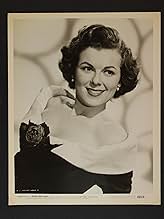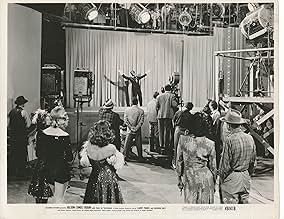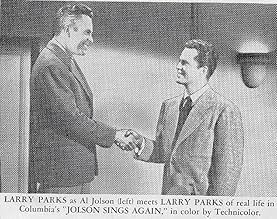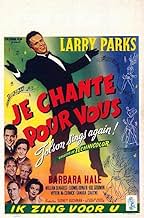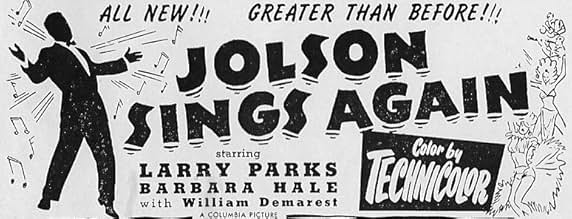Ajouter une intrigue dans votre langueIn this sequel to "The Jolson Story", we pick up the singer's career just as he has returned to the stage after a premature retirement. However, his wife has left him and the appeal of the s... Tout lireIn this sequel to "The Jolson Story", we pick up the singer's career just as he has returned to the stage after a premature retirement. However, his wife has left him and the appeal of the spotlight is not what it used to be. This time Jolson trades in the stage for life in the f... Tout lireIn this sequel to "The Jolson Story", we pick up the singer's career just as he has returned to the stage after a premature retirement. However, his wife has left him and the appeal of the spotlight is not what it used to be. This time Jolson trades in the stage for life in the fast lane: women, horses, travel. It takes the death of Mama Yoelson (Tamara Shayne) and Wo... Tout lire
- Réalisation
- Scénario
- Casting principal
- Nommé pour 3 Oscars
- 4 victoires et 5 nominations au total
- Cantor Yoelson
- (voix (chant))
- Headwaiter
- (non crédité)
- Writer
- (non crédité)
- Soldier
- (non crédité)
- Bing Crosby
- (voix)
- (non crédité)
- Self - Accordionist
- (non crédité)
- Sound Mixer
- (non crédité)
- Mr. Estrada
- (non crédité)
Avis à la une
The film picks up exactly where the original had ended. Disgusted with his life, Jolson (Parks) walks out on his show business career and for several years travels, dabbles with horses and lives a real care-free life.
With the death of his mother, (Tamara Shayne-who really doesn't look or act too Jewish at all), Jolson embarks on a tour for services until illness ends that.
There is a nice performance by Barbara Hale (the future Della Street) as the southern nurse that he marries. Hale has just the right Arkansas twang in her speech to carry it off.
When illness follows him, Jolson withdraws from entertaining fearing that his lung operation has affected his voice. He also feels that no one is really interested in him anymore. Unfortunately, the latter is true.
It is only when his life story is made into a motion picture that he makes a genuine come back.
Parks is absolutely amazing as Jolson. Though Al sang, Parks does a brilliant job of dubbing. His mannerisms are so easily identified as those of Al Jolson.
Ludwig Donath plays Jolson's cantor father. O my, a cantor eating in a non-kosher restaurant. What were the Hollywood writers thinking?
Just hearing Jolson belt out his usual great tunes is great in itself. Entertaining and wonderful to view.
If viewed together, "Jolson Sings Again" comprises with the predecessor a seamless 3-hour 44-minute presentation of this great entertainer's work. As with the original, much is pure fiction in the way it portrays Jolson's persona. This is even affirmed to a degree when Parks indicates to the screen writing team, after it is arranged in this picture to film "The Jolson Story," that they can juggle dates and facts as they like. He indicates his desire simply to show the performer who loved to entertain. A good friend of mine, who is an entertainer, a member of "The Jolson Society," and who has known some who themselves knew Jolson personally - as well as other things I've heard and read - indicated specific variances to this story.
Jolson apparently, instead of agreeing reluctantly to have his life story filmed, vigorously pursued this end. He also, with equal vigor, argued that he play himself, and purportedly did not have quite as "warm and fuzzy" relationship with Larry Parks as shown. It is also unbelievable, even "corny," how this man could be as amazed, even confused, by some of the events in the film. He had been singing during his entire life, starred in the first "talking" picture, appeared in several films, and made numerous records - from their earlier times. He was one of the pioneers through numerous innovations over many years years, in both film and records. Yet in the story, he is portrayed as naive, and totally surprised, to see the recording facilities the movie producer has. He exhibits an almost child-like amazement upon being shown the film clip of Parks' miming in-costume his recording of "Toot Toot, Tootsie" -- which the producer and Al's wife had "prodded" him into making. Although still interesting to view in the film, this is the most far-fetched of fiction.
One area of the story completely in harmony with real life, though, was depiction of his various tours entertaining armed service personnel. Jolson was admirably every bit as dedicated towards entertaining our military, as shown (actually, perhaps even more so!) - and did so during several conflicts, from the Spanish American to Korean Wars (visiting troops of the latter at his own expense) .
The portrayal of his continuing relationship with William Demarest's "Steve Martin" composite/fictional character, and Barbara Hale as his wife (2nd in this story, 4th in real-life) are warm and enjoyable to observe (Demarest's "Steve" is the spriest senior citizen ever, on film or off -- based on the overall time line of the two pictures, he would have been well into his 80's). And like the original, the music in this sequel is outstanding, the performances well-acted,
Le saviez-vous
- AnecdotesIn Le roman d'Al Jolson (1946), the performer who actually sings "Swanee" is Al Jolson himself. It is the only place in the film where he performs live on camera.
- Citations
Ellen Clark: [leaving room] My! We'll soon be smart as pigs!
- ConnexionsFeatured in The Lady with the Torch (1999)
- Bandes originalesCarolina in the Morning
(uncredited)
Music by Walter Donaldson
Lyrics by Gus Kahn
Performed by Larry Parks (dubbed by Al Jolson)
Meilleurs choix
Détails
- Durée
- 1h 36min(96 min)
- Rapport de forme
- 1.37 : 1


